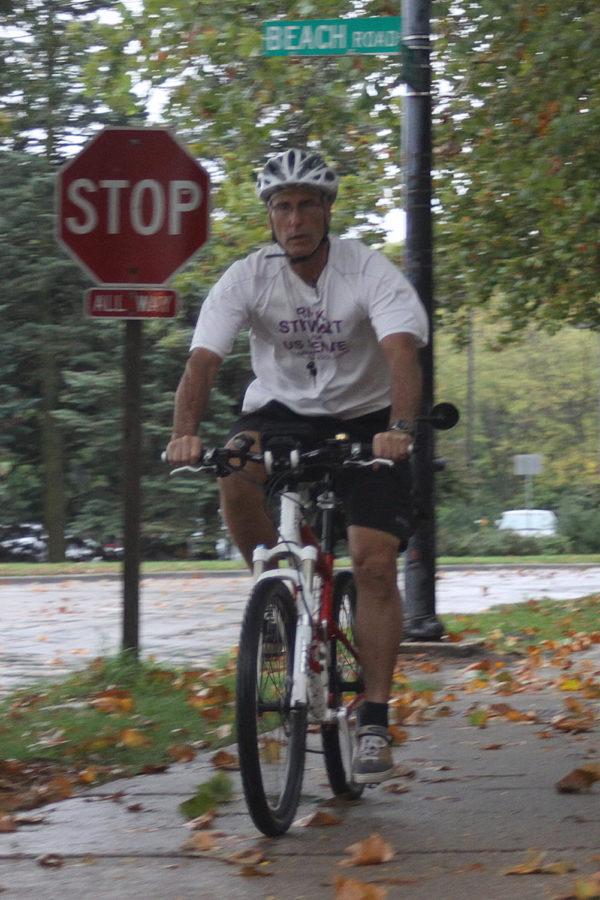Independent U.S. Senate candidate Rick Stewart bikes through Ames
Rick Stewart, independent candidate for U.S. Senate, rode his bicycle through all of Iowa’s 99 counties. Stewart came through Ames Oct. 2.
October 8, 2014
Rick Stewart is trying to insert his name into the political conversation in Iowa one tire rotation at a time.
Stewart is biking across all 99 counties during his campaign for U.S. Senate.
“The reason for the bike is that you’re trying to create a brand. We’ve done extremely well,” said Stewart.
Stewart, an independent from Cedar Rapids and retired businessman, received an MBA from the University of Chicago. His ‘grand slam’ achievement was starting his own business, Frontier Co-op, where he spent 24 years working and solving problems.
Stewart’s bike campaign started June 2. Before arriving in Ames Oct. 2, he had pedaled to, through or around 79 counties in Iowa speaking to local newspapers and citizens to spread his message.
“Solving real problems is a lot of fun,” Stewart said. “In business, people bring you problems every minute of every day. From inside, outside and lord knows where.”
While Stewart realizes that he can’t solve all problems, he said it is still a fantastic way for him to spend each day.
Stewart got into politics after retiring from business, when he had an opportunity to pay attention to other things.
“I entertain myself easily,” Stewart said. “I slacked a little bit, drank coffee in a chair, instead of on the run.”
One result of all the free time for Stewart was the opportunity to pay closer attention to politics.
Stewart said he began to notice that politicians actively try to not solve problems, as one way they can make sure they are re-elected is to still have that same problem in place.
“It’s a very strange dynamic, and completely the opposite of business.” Stewart said.
Stewart’s objective and interest in politics is taking care of the unfunded liability problem faced in the United States. While Stewart realizes one person may not be able to do this, they could at least force the government to put it on their books.
“Once it’s written down, people can talk about it.” Stewart said.
Unfunded liability can be calculated by subtracting all the debt legally owed from the total amount that the government has the legal right to take. Stewart said the current unfunded liability in the U.S. is $211 trillion. He estimated that this number goes up approximately $6 trillion more each year.
“There are 132 million working Americans. That’s more than one and a half million dollars per person,” Stewart said. “That not something that can be paid over the rest of your life.”
Stewart would like to eliminate student debt all together.
“Here’s an example: a student’s come and the college tells them it will cost $5,000, and the student’s family can’t afford that,” Stewart said. “The college gives them financial aid and says your family can afford to pay $1,000, and then the college pays the other $4,000.”
Stewart would like to cancel pell grants and student loans and make colleges lower their tuition.
“Parents and students have to pay as much as they can pay, and it doesn’t make any difference about the rest of it. It’s just fraudulent to claim that these student loans ‘help’ students.” Stewart said.
Some of the other issues on Stewart’s platform include ending the war on drugs, ending agricultural subsidies and fixing the immigration problem by selling green cards for a $50,000 charge.
In a race that’s been heavily dominated by television ads between Republican and Democratic nominees Joni Ernst and Bruce Braley respectively, Stewart has taken to the ‘sandbox game’ on Twitter in an effort to promote his campaign.
Stewart and his team have worked hard to ask friends and relatives to use the social media website. It is where they have concentrated their group energy, believing that it could work.
“The only thing [Braley and Ernst] spend their money on is negative, expensive TV ads,” Stewart said. “It’s because TV is where you get the biggest bang for your buck.”
In a system where two major parties dominate the system, it can become a challenge for candidates from third parties to really have much of a chance. What they can hope for, however, is to convince one of the two parties to champion their cause.
“Maybe the independent candidate really cares about environmental policy,” said David Andersen, assistant professor in political science, specializing in voter behavior and sentiment. “If voters really care about it and see neither party is doing anything, they might vote for him.”
Andersen argues that in a follow up election, the two parties may realize they could pick up that portion or segment of the voters if they adopt a certain stance.
“The only time they really have a chance is when one of the parties becomes so dominant that it isn’t really a two party competition,” said Andersen.
When an independent candidate does make it to congress, the only way they would be able to function is to caucus with one of the two major parties, Andersen said.
Although the chances of an independent candidate like Stewart to actually win the election are considered poor, biking can be a great way for an independent candidate to interact and promote themselves in a political campaign.
“Biking is a great, quirky way to meet people,” Andersen said. “Most candidates are on a bus or a limo. This will get people and the media to bite on it.”

















